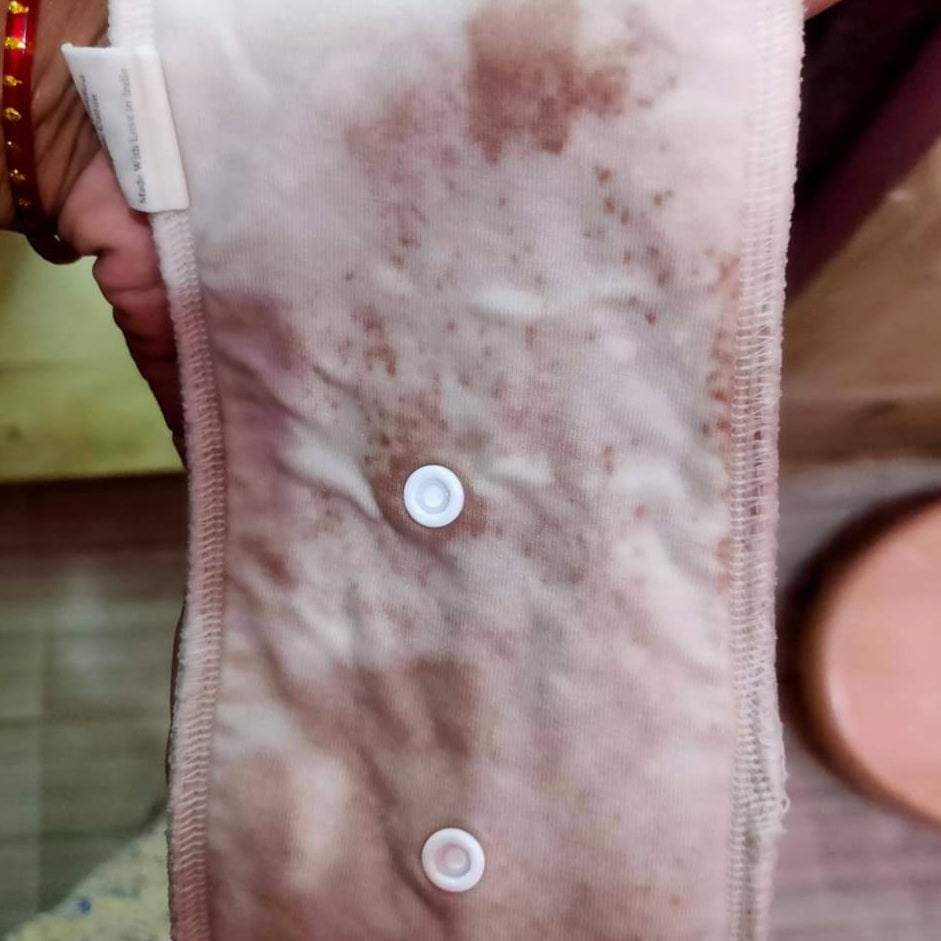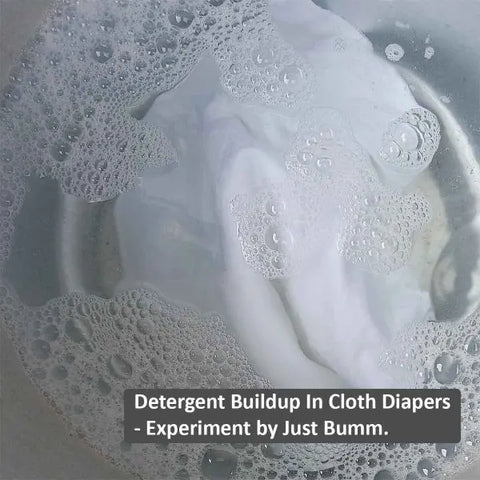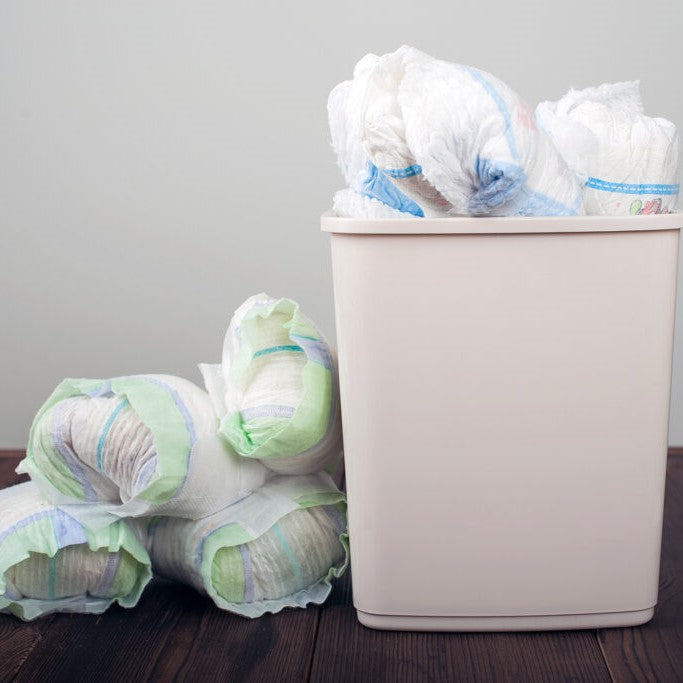Hard water means a lot especially if you are using Cloth Diapers for your baby. You may wonder how water can cause issues. It does and it is the worst problem you can ever face! Read on to find out how to tackle or avoid problems you may get because of Hard Water.
- What is Water Hardness?
- How to test Hard Water?
- What to do after testing?
- What happens in the long run?
Hard Water affected household pipes

What is Water Hardness?
Water that has high concentration of dissolved minerals like Magnesium and Calcium is called Hard water. Water condition is essential to get your laundry clean. Because detergents work relatively well in soft water as it breaks the surface tension. This allows water to clean out the dirt. This is the case for soft water. But in hard water, detergent acts on attacking the minerals which makes it hard for water to release the dirt from the fabric.
Types of Water Hardness
Hard water is very problematic not only for Cloth Diapers but also for your household. Due to calcium stearate formation, you will face blockage in plug holes and drains. There are two types of water hardness.
Temporary Hardness: This is caused by bicarbonate salts. You can simply remove temporary hardness by just boiling the water. When you boil the water, these bicarbonate salts decompose into insoluble carbonates.
Permanent Hardness: This is due to the presence of Sulphate & Chloride salts. You cannot remove permanent hardness by boiling the water. You can remove it only by chemicals means which is through ion exchange – water softening.
The Presence of these mineral ions slows down the surfactant property of detergents. You will find very less lather which is caused by this slowing down. That is why your laundry comes out dull and not so fresh after wash. If this process continues, the minerals will deposit in cloth diapers alongside the dirt. As detergent becomes ineffective, buildups will occur over time. And so your cloth diapers will not absorb and will start leaking.
How to test Hard Water?
While you find it easy to identify hard water around your household, it is as important to confirm it. Otherwise, you would be spending too much on nothing. So how do you test for hard water? There are some ways which you can follow. You can call up your local Municipal office to know if your area has hard water. They will also help in testing it. Or you can do it yourself at home. You will need a TDS meter that checks the water hardness.
When should you use water softener? Water hardness is determined in PPM (parts per million). Your TDS meter will show the reading. If it is 0-60 Ppm, then you have soft water. 61-120 is moderate hardness. If it reads 121-180 is considered to be Hard Water. Anything above 180 is very hard water. You should use water softener with your laundry for water hardness above 120 ppm. While we generally advice to use it above 100-110 ppm as it is safe for Cloth Diapers.
Some of the TDS meters you can buy from Amazon:
What to do after testing?
If you test for hard water and find that the levels are higher than 110 Ppm, you should start adding water softeners in your wash routine (For Cloth Diapers). You can add water softeners for normal clothes if the levels are higher than 120 ppm.
Why should you use water softeners? In Hard water, the detergent binds to the minerals instead of working on cleaning the dirt. So the pee does not get cleaned well. It will redeposit on to the layers of the pads. This will lead to mineral buildup – Inserts become hard at the point of impact (in the middle, you will feel the insert turning hard). When you use water softener, it will attach to the minerals, so the surfactants in the detergent will bind to the dirt and remove them with the help of water. As water softener binds to these minerals, the water will become soft producing more lather. Detergents work well in lathers.
Which Cycles should you use Water Softener? You should use water softener in all cycles – Prewash, Mainwash and Rinse cycle. You will see that many don’t suggest using water softeners for final rinse cycle. This is because, if you do machine wash, you don’t do a separate rinse wash. But if you hand wash, you should add water softener for every rinse too.
Things you will notice while using water softener:
There will be more lather (bubbles). This is perfectly normal. Because water softener will turn hard water into soft water. So there will be more bubbles. These are healthy lathers. The water will be slippery. This is for the same reason as above. So you need to be very careful with the amount of detergent you use. Anything more than the recommended amount will leave the cloth diapers soapy. Use the right amount of detergent so you don’t end up getting detergent buildup.
Best Water Softeners and Water Softening System:

- Blueoxy Water Softener (Recommended)
- Calgon Water Softener (Expensive)
- D’cal Water Softening Pod for Water Tank
What happens in the long run:
Hard water and Cloth Diapers are arch-enemies! It is inevitable that your diapers will be ruined. Unless you call forth their arch-bffs, Water Softeners! With high mineral content in hard water, the minerals binds with detergent molecules and forms soap scums. These in turn, attaches to the dirt – pee and poop in the diapers. Instead of cleaning the diapers, it makes it more dirty. Buildups keep forming without removing the dirt. This will lead to reduced absorbency causing leaks earlier than normal. In cases of severe buildup, the fabric starts repelling. When you pour water on top, it leaks out without even absorbing anything at all. You might think is that a big deal? Of course! There are bacteria. It will lead to rashes and infections.
How to tackle?
I would suggest you to keep your wash routine simple and easy. Adding water softener is the best way possible to minimize and prevent mineral buildups from occurring. Let’s look at some other ways that are commonly suggested and why it may not work out!
Give hot water rinse: This is a not-so-useful way to tackle the problem at hand. Such a cliché. Detergents that work well only in hot water are long gone. We are talking about permanent water hardness here! Hot water rinse does not decompose the buildup formed in the diaper and it does not decompose the hard water minerals! Even so, only if boiled, the minerals (temporary hardness) will be removed. Would you boil your baby’s cloth diapers? No. You shouldn’t do that. You will damage the cloth diapers, inserts disintegrate faster leading to wear and tear. Even detergent brands like Ariel suggests washing in Cold Water or Warm Water not exceeding 40 degrees.
Use more detergent: Strictly nope. Detergents in hard water focus on trying to soften them. Simply adding more will not make the water soft and clean the dirt simultaneously. You need an ion exchange process which can be done only by softeners. Also, you wouldn’t want to worsen your buildup problems. If your baby’s cloth diapers are already affected, you don’t want to add up detergent buildup to the list too.
What is the right way to tackle it? How to save affected diapers?
The right way to tackle hard water problem is to go the soft way! Get Water Softener and add it to your wash routine in each washing step. As for affected inserts, you should Strip and Bleach your Cloth Diapers to completely remove them! This will be covered in a separate post! Check out our How to Wash Cloth Diapers Blog for a simple, easy wash routine that will help you out!
Posts you may like:



Leave a comment
All comments are moderated before being published.
This site is protected by hCaptcha and the hCaptcha Privacy Policy and Terms of Service apply.